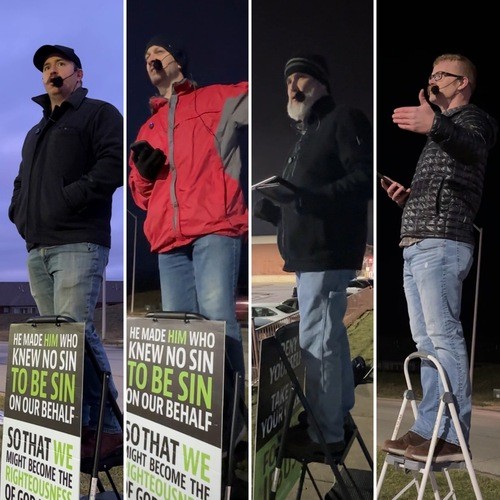Does Matthew 6:1-6 Prohibit Public Preaching?

“Beware of practicing your righteousness before men to be noticed by them; otherwise you have no reward with your Father who is in heaven.
“So when you give to the poor, do not sound a trumpet before you, as the hypocrites do in the synagogues and in the streets, so that they may be honored by men. Truly I say to you, they have their reward in full.
“But when you give to the poor, do not let your left hand know what your right hand is doing, so that your giving will be in secret; and your Father who sees what is done in secret will reward you.
“When you pray, you are not to be like the hypocrites; for they love to stand and pray in the synagogues and on the street corners so that they may be seen by men. Truly I say to you, they have their reward in full.
“But you, when you pray, go into your inner room, close your door and pray to your Father who is in secret, and your Father who sees what is done in secret will reward you.”
Matthew 6:1–6
“So when you give to the poor, do not sound a trumpet before you, as the hypocrites do in the synagogues and in the streets, so that they may be honored by men. Truly I say to you, they have their reward in full.
“But when you give to the poor, do not let your left hand know what your right hand is doing, so that your giving will be in secret; and your Father who sees what is done in secret will reward you.
“When you pray, you are not to be like the hypocrites; for they love to stand and pray in the synagogues and on the street corners so that they may be seen by men. Truly I say to you, they have their reward in full.
“But you, when you pray, go into your inner room, close your door and pray to your Father who is in secret, and your Father who sees what is done in secret will reward you.”
Matthew 6:1–6
Recently, a commentor on a Reformation Frontline Missions video suggested that Matthew 6:1-6 prohibits public preaching, so let’s unpack this idea.
In Matthew 6, Jesus instructs His disciples to avoid performing righteous acts for self-glorification: "Beware of practicing your righteousness before other people in order to be seen by them." He specifically addresses acts like almsgiving, prayer, and fasting, highlighting that hypocrites engage in these behaviors not out of love for God or neighbor, but for self-serving reasons. Importantly, Jesus does not condemn public prayer or almsgiving outright; rather, He criticizes doing these things solely to gain recognition from others.
Their argument was that if you are elevated or amplified—like standing on a ladder or using a speaker—while preaching the gospel, you fall into the category of hypocrites Jesus describes. This perspective seems to suggest that all public expressions of piety, including evangelism, should be conducted in secret.
However, in the previous chapter, Jesus encourages His disciples to "let your light shine before others, so that they may see your good works and give glory to your Father who is in heaven."
The commentor seems to overlook the key issue in Matthew 6: the motive of the heart. Being seen is not inherently sinful or hypocritical, as they claims. Jesus Himself indicates that our good works should be visible to others, serving as an opportunity for them to glorify God. If my intentions are purely self-serving, and I perform acts of piety to gain praise, then I am indeed acting hypocritically. While we should strive to minimize the visibility of our generosity, prayer, and fasting, evangelism by its very nature requires a public presence.
Furthermore, it's important to note that Jesus is not addressing the public proclamation of the gospel in this passage. I want to be seen and heard when I preach the gospel—not for my glory, but to direct attention to God. The goal is to make the message accessible: if no one can hear the gospel, what’s the point of preaching it?
To accuse those who publicly share the gospel of sin, pride, or hypocrisy simply due to the public nature of their preaching is both absurd and judgmental. We cannot discern the thoughts and intentions of others' hearts.
The distinction between Matthew 5:16 and Matthew 6 centers on motive and the source of glory. We should embrace both verses: our good works should shine in a way that points others to God, while our motives should always align with glorifying Him. As Matthew Henry wisely notes, "It is not unlawful to give alms when men see us; we may do it, but not so that men may see us."
In Matthew 6, Jesus instructs His disciples to avoid performing righteous acts for self-glorification: "Beware of practicing your righteousness before other people in order to be seen by them." He specifically addresses acts like almsgiving, prayer, and fasting, highlighting that hypocrites engage in these behaviors not out of love for God or neighbor, but for self-serving reasons. Importantly, Jesus does not condemn public prayer or almsgiving outright; rather, He criticizes doing these things solely to gain recognition from others.
Their argument was that if you are elevated or amplified—like standing on a ladder or using a speaker—while preaching the gospel, you fall into the category of hypocrites Jesus describes. This perspective seems to suggest that all public expressions of piety, including evangelism, should be conducted in secret.
However, in the previous chapter, Jesus encourages His disciples to "let your light shine before others, so that they may see your good works and give glory to your Father who is in heaven."
The commentor seems to overlook the key issue in Matthew 6: the motive of the heart. Being seen is not inherently sinful or hypocritical, as they claims. Jesus Himself indicates that our good works should be visible to others, serving as an opportunity for them to glorify God. If my intentions are purely self-serving, and I perform acts of piety to gain praise, then I am indeed acting hypocritically. While we should strive to minimize the visibility of our generosity, prayer, and fasting, evangelism by its very nature requires a public presence.
Furthermore, it's important to note that Jesus is not addressing the public proclamation of the gospel in this passage. I want to be seen and heard when I preach the gospel—not for my glory, but to direct attention to God. The goal is to make the message accessible: if no one can hear the gospel, what’s the point of preaching it?
To accuse those who publicly share the gospel of sin, pride, or hypocrisy simply due to the public nature of their preaching is both absurd and judgmental. We cannot discern the thoughts and intentions of others' hearts.
The distinction between Matthew 5:16 and Matthew 6 centers on motive and the source of glory. We should embrace both verses: our good works should shine in a way that points others to God, while our motives should always align with glorifying Him. As Matthew Henry wisely notes, "It is not unlawful to give alms when men see us; we may do it, but not so that men may see us."
Recent
Archive
2025
2024
November
